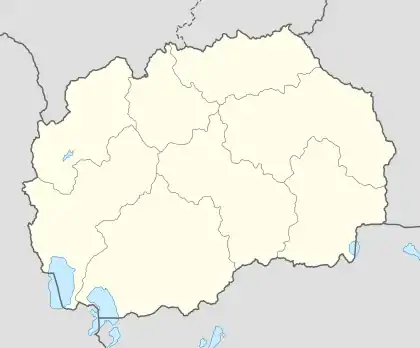Dihovo
Dihovo (Macedonian Cyrillic: Дихово) is a village in the municipality of Bitola, North Macedonia located about seven kilometers away from Bitola, the second largest city in the country. The village has a great position under Baba Mountain, and beautiful landscape.
Dihovo | |
|---|---|
Village | |
| Дихово | |
 Dihovo Location within North Macedonia | |
| Coordinates: 41°02′N 21°16′E | |
| Country | |
| Region | |
| Municipality | |
| Population (2002) | |
| • Total | 310 |
| Time zone | UTC+1 (CET) |
| • Summer (DST) | UTC+2 (CEST) |
| Car plates | BT |
| Website | . |
Demographics
In the early 19th century population of Dihovo, were inhabited in the past was populated by Tosks, a subgroup of southern Albanians.[1]
In statistics gathered by Vasil Kanchov in 1900, the village of Dihovo was inhabited by 200 Christians and 260 Muslim Albanians.[2] According to the statistics of Geographers Dimitri Mishev and D. M. Brancoff, the town had a total Christian population of 560 in 1905, of which all were Patriarchist Bulgarians.[3] It also had 1 Greek school.[3]
At the outbreak of the Balkan War in 1912, 3 people from Dihovo were volunteers in the Macedonian-Edirne militia. The village remained in Serbia after the Inter-Allied War in 1913.
In 1961 the village had 686 inhabitants. As a result of emigration to Bitola, Skopje, USA, Europe and Australia.
According to the 2002 census, the village had a total of 310 inhabitants.[4] Ethnic groups in the village include:[4]
- Macedonians 305
- Serbs 3
- Others 2
Dihovo is a Macedonian village. In 1951, families in village are:[5]
Plosnikovci (24 houses) oldest family in village. Settled from village Ivanjevci; Skubevci (14 houses) settled from village Lera, Bitola; Toncevci (7 houses) settled from some village near Korce in Albania. they think that their ancestors were orthodox Albanians, but mixed with orthodox Macedonians, and now speak only macedonian; Garagadzinja (5 houses) settled from village Gneotino; Karafilovci (5 houses) settled from village Oreovo, near Bukovo; Cvetkovi (3 houses) settled from village Drmeni in Prespa; Prespani (5 houses) settled from village Brajcino in Prespa; Jankulovci (2 houses), Janevci (13 houses), Gluvcevi (11 houses), Temelkovci (6 houses), Savini (6 houses), Bogojevci (5 houses), Vuckovi (5 houses), Kotovci (4 houses) and Damevci (2 houses) all of them with unknown origin. All settled in 19 century.
References
- Indogermanische Gesellschaft (1929). Indogermanisches Jahrbuch, Vol. 13. Karl J. Trübner. p. 183. "Monastir (Bitol) auch für das Studium des Alb. geeignet: Ostrec (11 km von Monastir), Zlokućani haben geg., Dihovo, Bratindol, Magarevo, Ramna, Kažani, Dolenci, Lera, Crnovec, Drevenik, Murgašovo tosk. Bevölkerung. Die tosk."
- Vasil Kanchov (1900), Macedonia: Ethnography and Statistics. Sofia. p. 239.
- Dimitri Mishev and D. M. Brancoff, La Macédoine et sa Population Chrétienne, p. 166
- Macedonian Census (2002), Book 5 - Total population according to the Ethnic Affiliation, Mother Tongue and Religion, The State Statistical Office, Skopje, 2002, p. 70.
- Trifunoski, Jovan, F. (1998). Bitoljsko-Prilepska Kotlina. Belgrade.